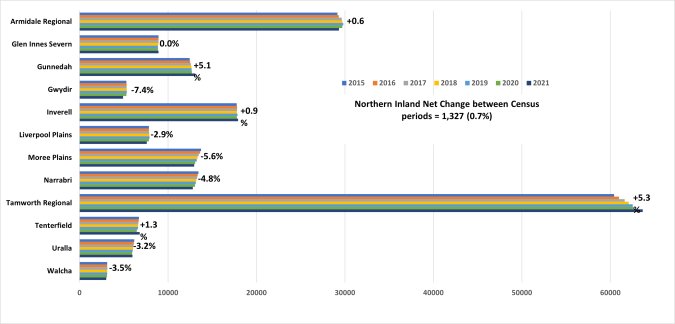-
Featured Items
-
Featured Resources
 Funding & Grants
Don't miss out on funding opportunities. Stay informed with our up to date online listings and email notifications.
Read More
Funding & Grants
Don't miss out on funding opportunities. Stay informed with our up to date online listings and email notifications.
Read More
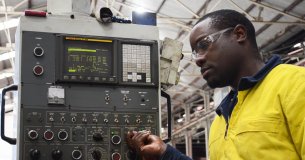 Skilled Migration
Our services help both applicants and employers, to learn more, develop plans, submit applications, and settle in.
Read More
Skilled Migration
Our services help both applicants and employers, to learn more, develop plans, submit applications, and settle in.
Read More
 Research and Analysis
Good research and analysis makes the case. How can our resources and services help your project or application?
Read More
Research and Analysis
Good research and analysis makes the case. How can our resources and services help your project or application?
Read More
 Information & Data Resources
With resources like REMPLAN, Regional Knowledge Base, and decades of data, discover how we can help your project.
Read More
Information & Data Resources
With resources like REMPLAN, Regional Knowledge Base, and decades of data, discover how we can help your project.
Read More
-
Stay InformedSubscribe to one or more of our regular email subscriptions, to be kept up to date on news and funding opportunities for the region
-
-
Our Region
- Our Region
- Regional Plan
- Regional Data
- Current Regional Issues
- Population Migration Analysis for 2016-21
- Job Vacancies Continue at All-Time High
- National Debt - What it Means for Our Economy?
- The True Value of Home Solar
- The Economic Impacts of Local Government Amalgamations
- State of the Regions Report 2014-15
- Antifragility - A different take on regional economic development
- Biohubs - Collaborative Waste Management
- Attracting New Residents
- Socio-Economic Impacts of the Murray Darling Basin Plan
- Murray Darling Basin Water Recovery
- Growing Businesses
- The Northern Inland Economy
- Geographical Overview
- Major Industry Sections
- Our Services
- Grants and Funding
-
Skilled Migration
- Skilled Migration
- Skilled Employer Sponsored Regional Visa
- Skilled Work Regional Visa (subclass 491)
- Temporary Seasonal Workers
- Designated Area Migration Agreement (DAMA)
- Helpful Information for Visa Holders
- Information for Employers
- Case Studies
- Payment Details
- Advice & Further Information
- Contact Details
- News & Events
-
Our Projects
- Our Projects
- Current Projects
- Skilled Migration
- Wool Works - Wool Training Schools
- Metal Works - Welding and Fabrication Schools
- Come On Inland
- Stories of Resilience
- Alt Brothers Beekeeping - Glen Innes
- Carelle's Toy Store - Glen Innes
- Greenhill Orchards - Arding
- Gwydir Meats - Warialda
- Kaputar Motors - Narrabri
- Moonbi General Store - Moonbi
- Sandstock - Tingha
- Sherelle Fashions - Tenterfield
- Sleepy Merino - Inverell
- Tenterfield Chamber of Toursim, Industry and Business - Tenterfeild
- The Welders Dog - Armidale
- Walcha Veterinary Supplies - Walcha
- AGCAP - Agribusiness Careers & Professions
- Northern Inland Regional Investment Profile
- Past Projects
- Digital Economy Strategy
- Business Growth Project
- Go Digital
- How to Start an Online Business
- Create Your Website Using Squarespace
- How to Edit Your Squarespace Site - Part 1
- How to Edit Your Squarespace Site Part 2
- Add a Shop to Your Squarespace Site
- Start a Blog and Find out What Customers are Searching
- 14 Tips For a Better Blog Post
- Which Social Media Platforms are Best for Your Business
- How to Use Facebook Effectively For Your Business – Part 1
- How to Use Facebook Effectively For Your Business – Part 2
- Instagram Tips for Business
- Catching Up, More Instagram & Dealing with Haters
- Getting Started with Twitter for Business
- Social Media Scheduling Tools
- How to Start an Etsy Shop – Part 1 – Research
- How to Start an Etsy Shop – Part 2 – Signup
- Online Security for Your Business
- Product Photography and Website Images: Your Guide
- 5 Tips to Improve your Productivity in your Business
- Best Online Business Resources
- How to Improve Your Communication Skills and Win More Clients
- NBN Coordinator
- Putting Power Back in the Regions
- Road Freight Study
- Town Audit Benchmarks
- Food and Wine
- Youth Survey
- Digital TV Switchover Assistance
- Northern Inland Transport Guide
- Live.Train.Work
- Northern Inland Innovation Awards
- Northern Inland Innovation Awards - 2017
- Northern Inland Innovation Awards - 2016
- Northern Inland Innovation Awards - 2015
- Northern Inland Innovation Awards - 2014
- Northern Inland Innovation Awards - 2013
- Northern Inland Innovation Awards - 2012
- Norther Inland Innovation Awards - 2011
- Prime Super Northern Inland Innovation Awards - 2010
- Prime Super Northern Inland Innovation Awards - 2009
- Northern Inland Innovation Awards - 2007
- Northern Lights Project
- NBN Smart Home
- Murray Darling Basin
- Moree Plains Business Workshops
- Namoi Investment Prospectus
- Industrial Land
- Bioenergy and Local Electricity Retailing
- Northern Inland Business Energy Assessment
- Skills for the Future
- Impacts of COVID-19 on Businesses
- Past Projects of NIRDB
- Aboriginal Employment and Enterprise in the Gunnedah Region
- Art as an Industry
- Aviation Survey
- Farm Forestry - Northern Inland Forestry Investment Group
- New England North West Film Strategy
- Northern Inland Excellence in Business Awards
- Food and Wine 2003 - 2008
- Prime Super Northern Inland Innovation Awards 2009
- Regional Business Networking Program
- Regional Leadership Course 2008
- Viticulture Strategy 2002-2003
- About Us
- Contact Us
- Other Resources
- Privacy and Legal
- Search
- News & EventsNews & Events
- NewslettersNewsletters
- General Newsletter - 29th of November 2022General Newsletter -…
Back to Newsletters
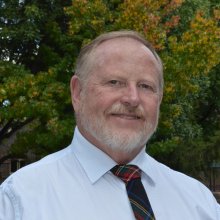
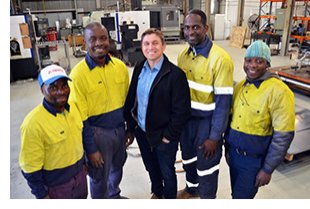
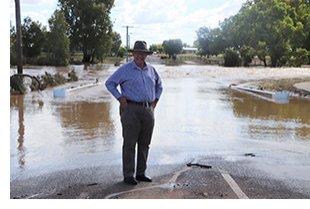
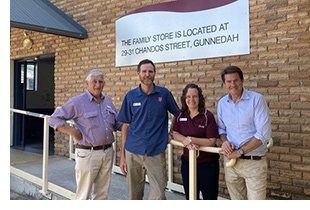
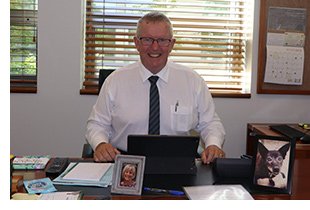
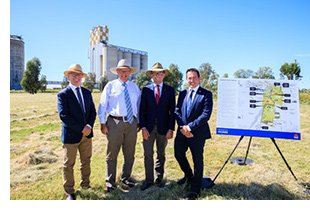
General Newsletter - 29th of November 2022
Tuesday 29th of November 2022
In this Issue
- Welcome from the Chair
- Information Session for Businesses About Skilled Migration
- Further Support for Flood Affected Areas Announced
- Census Data Shows Low Population Growth in Our Region
- Local Federal Member Celebrates 15 Years of Service
- Challenges for Local Government Discussed at National Forum
- Moree Special Activation Precinct a Step Closer
- Featured Grants and Funding Opportunities
Welcome from the Chair

Dear Northern Inlanders,
Sourcing skilled workers continues to be a key factor impeding the operation and growth of our local businesses. So, we are pleased to partner with the NSW and Australian Governments to provide an information session on skilled migration in regional NSW. This free session for businesses and industry leaders will be held on Monday, 5 December, and registration is now open. While the session will be delivered in person in Armidale, it will also be made available via Zoom to allow participation from anywhere in the Northern Inland.
Employment opportunities, such as those provided by the Moree and Narrabri Special Activation Precincts and the Inland Rail, are a key factor in the growth of our region. It was disappointing to see the low level of population growth for our region as a whole in the recently released 2021 Census data, which we should take with a grain of salt. While the Local Government Areas of Tamworth Regional and Gunnedah saw population growth above NSW as a whole, unfortunately, other LGA's were either static or declining. Further details on the analysis by our Senior Economist, David Thompson, are available below.
Local Governments are significant employers in our communities and play a vital role in providing services and support. However, many are facing various challenges, as highlighted in the 2022 Local Government Workforce Skills and Capability Survey results released last week. The forum hosted by the Hon. Kristy McBain, highlighted the importance of all levels of Government working together to address the issues and priorities raised in the report and the forum.
Regards,
Russell Stewart
Chair
Information Session for Businesses About Skilled Migration

In partnership with the NSW Department of Enterprise, Investment and Trade, the Australian Government Department of Home Affairs and the Migration Institute of Australia, we are pleased to invite business owners and industry leaders to an industry briefing on skilled migration in Regional NSW.
The event will provide a comprehensive overview of Australia's migration programs and how they support businesses and industries across the Northern Inland region with workforce needs.
Date: Monday, 5 December
Time: 10:00am – 11:30am (AEDT)
Venue: Nova Theatrette, University of New England, 122 Faulkner St, Armidale
If you are based in Armidale, we encourage you to attend in person to enjoy networking and a catered lunch.
This event will also be live streamed on Zoom for participants across the Northern Inland region. Details are available through the registration page.
Registration is free and open to business and industry leaders across the Northern Inland region. Please register early to secure your seat.
Event Agenda
9:30am - 10:00am - Registration
10:00am – Welcome
Russell Stewart Chair, RDA Northern Inland & Ross Wood, Senior Associate, NSW Department of Enterprise, Investment and Trade
10:05am - Overview of RDAs role in Australia's migration programs
Russell Stewart, Chair RDA Northern Inland & Nathan Axelsson, Executive Director RDA Northern Inland.
10:15am - Overview of the NSW Skilled Migration Program
Ross Wood, Senior Associate, NSW Department of Enterprise, Investment and Trade
10:35am - Overview of Australia's regional Migration and industry support programs
Servant Brennan, BIRO, Department of Home Affairs
10:55am - Migration Agent Services and Support
Migration Institute of Australia
11:10am - Question and Answer Session
11:30am - Closing remarks
Department of Enterprise, Investment and Trade
12:00pm to 12:30pm - Light Lunch
12:30pm to 2pm - Information Sessions for Skilled Migrants
Further Support for Flood Affected Areas Announced

Although the flood waters are receding across our region, there is still much work to recover. Further financial support has been announced for small businesses, not-for-profits, primary producers, and individuals affected by the recent floods in disaster-declared areas, including Glen Innes, Gunnedah, Gwydir, Inverell, Liverpool Plains, Moree Plains, Narrabri, Tamworth, Uralla, and Walcha. Relevant disaster declaration numbers are ARGN 1030 (August) AGRN 1034 (September onwards).
The support available varies by local government area but may include:
Local Government Recovery Grants
$1 Million for local councils for projects which support economic and social recovery at a local level.
Disaster Recovery Small Business and Not-For-Profits Grant
$50,000 to help pay for the costs of clean-up and reinstatement of a small business or not-for-profit organisation's operations.
Primary Producers Special Disaster Grant
Up to $75,000 to help pay for the costs of clean-up and reinstatement of primary production enterprises that have suffered direct damage. Eligible impacted landholders will also be able to access Rural Landholders Grants of up to $10,000, helping them to recover from flood damage to their properties.
Some of the assistance available to eligible residents includes the following:
The Australian Government Disaster Recovery Payment (AGDRP)
A one-off payment of $1,000 per eligible adult and $400 per eligible child for flood-impacted people within eligible LGAs.
The Disaster Recovery Allowance (DRA)
Provides income support fortnightly for up to thirteen weeks for eligible people who can demonstrate that they have experienced a loss of income as a result of flooding within eligible LGAs.
Finding the support that is available to you can be difficult, particularly at a stressful time. The Service NSW's Disaster Assistance finder will help you find the support that is available to you based on your circumstances.

A Recovery Assistance Point will operate in Gunnedah to help individuals, families, farmers and business owners recover from flooding. Recovery Assistance Points bring together NSW Government agencies, Commonwealth agencies, the local council, community organisations and welfare bodies under one roof.
"As we transition from response to recovery, it can be difficult for people know where to start," Mr Anderson said. "Recovery Assistance Points function as a first port of call for people needing to access the various types of flood recovery support available. Whether you need to replace damaged documents, receive assistance with the physical clean-up, access emergency accommodation or utilise mental health services, I encourage everyone who has been impacted by the flooding in the Gunnedah Shire to visit."
The Gunnedah Recovery Assistance Point will operate from The Salvation Army, 30 Tempest Street, on:
Census Data Shows Low Population Growth in Our Region
As the 2021 Census data becomes available, we are able to assess important regional data such as changes to population figures for each of our local government areas.
The chart below shows changes in Estimated Resident Population (ERP) between 2015 and 2021. ERP is the official measure of Australia's population based on the concept of usual residence. It refers to all people, regardless of nationality or citizenship, who usually live in Australia, with the exception of foreign diplomatic personnel and their families. It includes usual residents who are overseas for less than 12 months. It excludes overseas visitors who are in Australia for less than 12 months. The ERP is based on the results of the Census of Population and Housing.
Northern Inland Estimated Resident Population
The figures for our region are sobering, with just a 0.7% increase in ERP between 2016 and 2021. In that same period, NSW as a whole has grown by 4.7%.
The changes in ERP between 2015 and 2021 are not shared equally amongst the LGAs with Tamworth and Gunnedah showing good growth relative to NSW as a whole, while all other LGAs were either static or declining.
Whilst population data must be taken with a grain of salt, this lack-lustre performance in population is the primary reason our region does not get its fair share of services relative to metropolitan areas and larger regional centres. Governments will always be prone to putting more resources into areas of strong population growth, and if we wish to share in that, we need new economic initiatives to grow and attract businesses and residents.
Local Federal Member Celebrates 15 Years of Service

Federal Member for Parkes, Mark Coulton is celebrating 15 years since he was first elected to the House of Representatives as a Member of Parliament last week.
The Parkes Electorate covers an area of 393,413 square kilometres, which is 49% of NSW. It incorporates 18 local government areas, including the Northern Inland LGAs of Gwydir, Moree Plains, Narrabri, and Gunnedah. Mark became the Member for Parkes on 24 November 2007, with a 46.77% share of the vote.
"When I was first elected back in 2007, I certainly didn't expect I'd still be here 15 years later," Mr Coulton said. "I didn't have a long-term plan for how long I'd do this job, I was just thrilled to receive the support to be elected for my first term."
"It's an incredible honour to do this job, and a privilege to represent the wonderful people of the Parkes electorate," Mr Coulton said. "I'm extremely proud of everything we've been able to achieve over the past 15 years and it's heartening to see the progress and development of communities throughout the electorate thanks to funding and programs I've helped to secure."
"I think what has kept me going for the past 15 years has been the drive and desire to see things through. I worked out early on that it does take some time to learn how to do this job and to get to know the people that you represent. Once I was in a position where I'd built up those relationships, I didn't want to just throw those away because I know it's unsettling for communities to constantly change their local member. I felt it was important that I did this job for a reasonable length of time to be able to make positive change and get things done."
Mr Coulton is proud of his achievements over the years, but he says that being re-elected six times has underpinned it all. "My overall proudest achievement is actually winning the trust of the people of the Parkes electorate and being supported six times for re-election so that I've had an ability to actually work with all my constituents and communities," Mr Coulton said. "When it comes to projects I'm most proud of, it would have to be the Western Cancer Centre which is providing life-saving cancer treatment to people throughout western NSW, and Inland Rail which will transform our national freight and supply chain capabilities while providing endless opportunities for communities in the electorate."
"I’m also proud to have been involved in the establishment of the Local Roads and Community Infrastructure Program which is underpinning so much of the great work local councils have been undertaking in recent years. The work that I’ve done to increase the rural health workforce through programs I implemented as Minister is another source of great pride for me.”
Mr Coulton said it’s the people he’s met along the way that make it all worth it. “It is an all-consuming job; it takes a lot of energy to cover an electorate the size of mine, but I draw passion and enthusiasm from the people I’m working with,” Mr Coulton said. “It’s the relationships and friendships that I’ve built up over the 15 years with not only individual people but also organisations that I work with on a regular basis – that’s the best part of this job.
“I’m just as passionate about being the Member for Parkes today as I was 15 years ago, and I look forward to continuing to represent my constituents into the future.”
Challenges for Local Government Discussed at National Forum
Key challenges facing local governments across Australia in skills, workforce, housing and financial sustainability were discussed last week at the Local Government Ministers’ Forum.
Convened by the Minister for Regional Development, Local Government and the Territories Kristy McBain, the forum provides an opportunity for ministers from all Australian jurisdictions as well as the president of the Australian Local Government Association (ALGA) to discuss and collaborate on issues impacting local governments.
“It was my pleasure to convene the first Local Government Ministers’ Forum of the Albanese Government and I look forward to continuing to work with my forum colleagues as we address the challenges facing Australia’s local governments.” Said Minister McBain. “Collaboration across all levels of government is critical to progressing the priorities raised today, particularly in light of the rolling emergencies faced by local governments across Australia.”
Top of the agenda this year was the need for consistent, clear and sustainable frameworks to support local Government, particularly in an environment of rolling natural emergencies.
Local Government is a major national employer, with over 190,800 workers across 400 occupations. The forum also discussed the findings of the 2022 Local Government Workforce Skills and Capability Survey, funded with $250,000 from the Australian Government and completed by 210 local governments through engagement with ALGA.
Some of the key national findings from the survey were:
- 91 per cent of councils reported difficulty recruiting suitably qualified talent to fill advertised job vacancies in 2022, a figure that is up from the 69 per cent reported in 2018.
- Local governments continue to experience critical shortages in several occupations including engineers, town planners, building surveyors, environmental health officers and accountants. This has been exacerbated by the pandemic, successive natural disasters, impacts of climate change, the accelerated take-up of technology and the digitisation of services.
- Resourcing, organisational capacity, supply constraints and cultural barriers are longstanding challenges facing local governments.
- Local governments increasingly need workforces that are equipped to manage changing environments and transitioning economies both in the regions and cities.
The forum considered the implications of the report, some solutions that are already being trialled at the local level to address these challenges, and potential opportunities to scale or expand them across jurisdictions in the coming months.
Other key discussions included the impact of significant housing shortages in communities, as well as opportunities for greater collaboration between all levels of Government – particularly in the delivery of services in regional areas.
Moree Special Activation Precinct a Step Closer

The Delivery Plan for the $194 million Moree Special Activation Precinct (SAP) has been completed and released to the public, bringing the project a step closer to completion.
Special Activation Precincts are a new way of planning and developing industrial and commercial infrastructure in targeted areas of regional NSW. By providing the right planning framework, approvals and infrastructure are put into place quickly and efficiently, allowing for the attraction of businesses, industry and jobs to the area.
The Delivery Plan outlines operation opportunities and includes design, landscaping, infrastructure planning, delivery and proposal assessment process criteria. The SAP can now progress to the design and construction phase.
“It’s great to see progress continuing at the precinct which will transform the region into a world-class agricultural economy for northern NSW, create up to 4,000 jobs by 2060 and deliver a huge boost for Moree,” said Adam Marshall, Member for Northern Tablelands.
“The delivery plan provides confidence to industry and investors interested in establishing their business in the precinct, with a streamlined planning and approval process to cut red tape and enable a faster set-up. The delivery plan also brings to life how the precinct will look in the future, with design principles that promote innovation, connection to Country, safety and efficient movement across freight and logistics, as well as connection to the Moree township.”
The delivery plan was finalised following a public exhibition, with feedback received informing the final plan. Mr Marshall thanked the community and Moree Plains Shire Council for their involvement and support for the precinct to date. “Moree has so much to offer as the most productive agricultural region in Australia and I cannot wait for this region to become a productivity and value-adding powerhouse that delivers economic growth and job opportunities for years to come,” Mr Marshall said.
“The SAP, together with Inland Rail, will be the foundation stones of a new era of economic growth and development for the region.”
Further details on the Moree Special Activation Precinct are available on the Moree Plains Shire Council website.
Featured Grants and Funding Opportunities
Below are some featured grants and funding opportunities from the multitude of open grants listed in the Grants and Funding Opportunities area of our website. Our website is updated weekly with new listings and updates and all are applicable to our region, so it is a great resource if you are looking for funding for a specific project.
You can also sign up to our Business and Infrastructure Funding Opportunities and the Community Grants and Award Programs newsletters through the simple form located on the left-hand side of our website: www.rdani.org.au, to receive monthly summaries of currently open grants.
Future Drought Fund: Extension and Adoption of Drought Resilience Farming Practices
Closes: 9th of January 2023 - 9:00 pm
Value: $100,000 to $3 Million
Run By: Australian Government Department of Agriculture, Fisheries and Forestry
The Future Drought Fund is a long-term investment fund that provides a sustainable source of funding to help Australian farmers and agricultural-dependent communities and businesses become more prepared for, and resilient to, the impacts of drought. From July 2020, $100 million is available each year from the Fund to invest in drought resilience programs.
The objective of this program is to fund activities that support increased adoption, including through demonstration, of proven and existing (Australian and international) research and development (R&D) drought resilience practices and technology that:
- reduce the impacts of drought on agricultural productivity and/or enable a quicker recovery of farmers and their lands from drought
- have potential to be adopted at a large scale (either across multiple farms, a farming system, landscapes, regions or industries)
- can demonstrate public benefits.
National Science Week Grants 2023
Closes: 15th of December 2022 - 5:00 pm
Value: $2,000 to $20,000
Run By: Australian Government Department of Industry, Science and Resources
National Science Week is Australia’s major national celebration of the sciences, occurring in August each year. National Science Week will be held from 12 to 20 August 2023. National Science Week provides the opportunity for community participation in high profile science engagement activities across the nation.
The objectives of the grant opportunity are to:
- inspire wide community participation in STEM
- provide an opportunity to acknowledge and celebrate the contributions of Australian scientists to the world of knowledge
- encourage an interest in science pursuits among the general public
- encourage younger people to become fascinated by the world we live in.
Caravan Parks Grant Program
Closes: 22nd of December 2022 - 4:00 pm
Value: $10,000 to $100,000
Run By: Australian Trade and Investment Commission (Austrade)
This Program aligns with Austrade’s work on improvements in visitor infrastructure through priorities under The Reimagining the Visitor Economy (THRIVE) 2030 strategy 2.
The objective of the Program is to provide grants up to $100,000 to assist caravan parks to swiftly upgrade or create new infrastructure and visitor facilities to enhance visitor experience, including improvements to accessibility and environmental sustainability practices.
The intended outcomes of the Program are to:
- Increase the number of visitors seeking caravan park accommodation at a destination.
- Increase a destination’s attractiveness or capacity to meet visitor needs through new and improved infrastructure and facilities at local caravan parks.
- Increase the capacity and improve the quality of caravan park infrastructure and facilities for visitors at a destination.
Related Pages







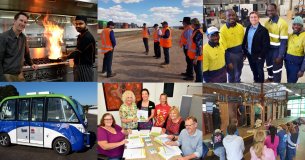 Latest News
Latest News
